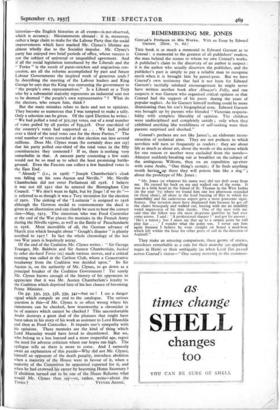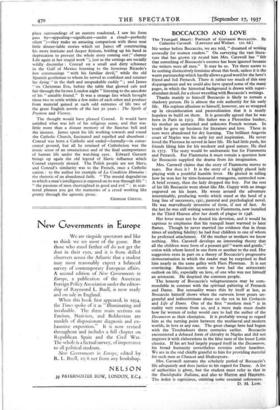REMEMBERING MR. JONES
Conrad's Prefaces to His Works. With an Essay by Edward Oarnett. (Dent. 75. 6d.)
Tips book is as much .a memorial to Edward Garnett as to Conrad : a memorial to the greatest of all publishers' readers, the man behind the scenes to whom we owe Conrad's works. A publisher's claim to the discovery of an author is suspect : it is the author who usually discovers the publisher, and the publisher's part is simply to pay a reliable man to recognise
merit when, it is brought hint by parcel-post. But we have Conrad's own testimony that had it not been for Edward Garnett's tactfully subdued encouragement he might never have written another book after Abnayer's Folly, and one suspects it was Garnett who organised critical opinion so that Conrad had the support of his peers during the years of popular neglect. As for Garnett himself nothing could be more illuminating than his son's biographical note. Edward Garnett was brought up by parents who blended " Victorian respecta- bility with complete liberality of opinion. The children were undisciplined and completely untidy ; only when they exhibited anything like worldliness or self-seeking were their parents surprised and shocked."
Conrad's prefaces are not like James's, an elaborate recon- struction of technical aims. They are not prefaces to which novelists will turn so frequently as readers : they are about
life as much as about art, about the words or the actions which for one reason or another were excluded from the novels- Almayer suddenly breaking out at breakfast on the subject of the ambiguous Willems, then on an expedition up-river with some Arabs, "One thing's certain; if he finds anything worth having,,up there they will poison him like a dog " ; about the prototype of Mr. Jones : " Mr. Jones (or whatever his name was) did not drift away from me. He turned his back on me and walked out of the room. It was in a little hotel in the Island of St. Thomas in the West Indies (in the year '75) where we found him one hot afternoon extended on three chairs, all alone in the loud buzzing of flies to which his immobility and his cadaverous aspect gave a most gruesome signi- ficance. Our invasion must have displeased him because he got off the chairs brusquely and walked out, leaving with me an indelibly weird impression of his thin shanks. One of the men with me said that the fellow was the most desperate gambler he had ever come across. I said : A professional sharper ? and got for answer : ' He's a terror ; -but I must say that up to a certain point' he will play fair . . . ' I wonder what the point was. I never saw him again because I believe he went straight on board a mail-boat which left within the hour for other ports of call in the direction of Aspinall."
They make an amusing comparison, these germs of stories, anecdotes remarkable as a rule for their anarchy (an appalling negro in Haiti) or their ambiguity (as when Lord Jim passed across Conrad's vision—" One sunny morning in the common-
place surroundings of an eastern roadstead, I saw his form pass by—appealing—significant—under a cloud—perfectly silent ")—they make an amusing comparison with those neat little dinner-table stories which set James off constructing his more intricate and deeper fictions, holding up his hand in deprecation to prevent the whole story coming out (" cluinsy Life again at her stupid work "), just as the settings are socially wildly dissimilar : Conrad on a small and dirty schooner in the Gulf of Mexico listening to the ferocious Ricardo's low communings " with his familiar devil," while the old Spanish gentleman to whom he served as confidant and retainer lay dying " in the dark and unspeakable cuddy " ; and James "on Christmas Eve, before the table that glowed safe and fair through the brown London night " listening to the anecdote of his " amiable friend." It was a strange fate which brought these two to settle within a few miles of each other and produce from material gained at such odd extremes of life two of the great English novels of the last 5o years : The Spoils of Poynton and Victory.
The thought would have pleased Conrad. It would have satisfied what was left of his religious sense, and that was little more than a distant memory of the Sanctus bell and the incense. James spent his life working towards and round the Catholic Church, fascinated and repelled and absorbent : Conrad was born a Catholic and ended—formally—in conse- crated ground, but all he retained of Catholicism was the ironic sense of an omniscience and of the final unimportance of human life under the watching eyes. Edward Garnett brings up again the old legend of Slavic influence which Conrad expressly denied. The Polish people are not Slays, and Conrad's similarity was to the French, once a Catholic nation : to the author for example of La Condition Hwnaine : the rhetoric of an abandoned faith. " The mental degradation to which a man's intelligence is exposed on its way through life " : " the passions of men shortsighted in good and evil " : in scat- tered phrases you get the memories of a creed working like poetry through the agnostic prose.
GRAHAM GREENE.











































 Previous page
Previous page